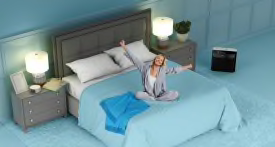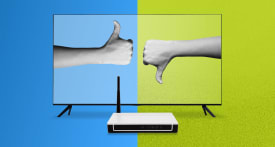Should You Take Trazodone for Insomnia?
Prescriptions for this little-known drug spiked during the COVID-19 pandemic. But does it work—and is it safe?

The number of people suffering from insomnia has surged during the pandemic: Twenty-eight percent of Americans, in fact, said they’ve had a harder time falling or staying asleep since its onset, according to a November 2020 Consumer Reports nationally representative survey (PDF).
That sleeplessness has also triggered a wave of people seeking relief. Google searches for “insomnia” jumped 58 percent in the months following the pandemic’s onset, according to a February 2021 study in the Journal of Clinical Sleep Medicine. Prescriptions for insomnia drugs also increased, according to GoodRx, a prescription drug research firm.
Some of those prescription meds, such as Ambien, Belsomra, and Lunesta, are quite familiar. But prescriptions also spiked for another drug often used to help people fall asleep: trazadone, a decades-old antidepressant that can cause drowsiness as a side effect.
Trazodone, in fact, has long been among the most commonly prescribed medications to treat sleeplessness.
Here’s why so many people with sleep problems turn to it, and what to do if your doctor suggests you try it.
What Is Trazodone, Anyway?
Trazodone was first approved as an antidepressant by the Food and Drug Administration in 1981. Although doctors can legally prescribe trazodone (and all drugs, for that matter) for any reason, even if it’s not FDA-approved for that use, the drug has never been approved to treat insomnia.
Why Trazodone Is Prescribed So Often
Though trazodone is rarely used to treat depression alone anymore, it’s widely prescribed off-label at lower doses for treating insomnia.
One reason could be because that unlike other insomnia drugs, including Ambien, trazodone isn’t classified by the FDA as a controlled substance (PDF) because there’s little risk of it causing dependency and abuse. As a result, doctors can prescribe trazodone without a limit on how many pills a patient can receive.
And perhaps because trazodone is unlikely to cause dependence, the high levels of prescribing suggests that many physicians may believe trazodone is safer than other frequently prescribed sleep medications. But there are no studies that confirm this.
Another reason trazodone may be prescribed frequently is that it’s inexpensive. It’s available only as a generic, and we found it for as little as $4 for a month’s supply at Walmart.
Other drugs approved to treat insomnia can impair your ability to recall new experiences and may even—although rarely—cause you to walk, eat, have sex, or drive a car while essentially unconscious. There’s no evidence that trazodone can cause those serious side effects. Moreover, many doctors believe that trazodone is less likely to cause renewed insomnia once patients stop taking it, although there’s little evidence to support that.
Trazodone Risks You Should Know About
Trazodone isn’t without risks, however. It appears to be more likely than other sleep drugs to leave you feeling drowsy the next day, which increases the chance of having an accident, particularly while driving or using heavy machinery.
It can also cause abnormally low blood pressure and, in turn, trigger dizziness or even fainting, particularly in seniors, which can increase the risk of falling. A study in the Canadian Medical Association Journal found that seniors with dementia who were given trazodone as a sleep aid were as likely to fall as seniors given antipsychotics, other drugs that can cause sedation.
Trazodone can also cause heart rhythm disorders. And some evidence suggests that it can cause priapism, or persistent erection, a medical emergency that may require surgery and can lead to impotence if not treated promptly.
And a black box warning in the package insert (PDF) notes that trazodone, like other antidepressants, can increase the risk of suicidal thoughts and behavior in children and adolescents, even when taken at approved doses for depression.
The Bottom Line on Trazodone
For the average person who has occasional bouts of insomnia, making certain lifestyle changes may help the most, including avoiding big meals, alcohol, smoking, and exercising late at night, and working or watching TV in bed.
If these actions don’t help, you could consider, with your doctor’s input, trying an inexpensive over-the-counter drug containing an antihistamine, such as diphenhydramine (Benadryl Allergy, Nytol, Sominex, and generic) or doxylamine (Unisom Nighttime Sleep-Aid and generic) for just a few nights.
But it’s important to know that though those drugs are FDA-approved to treat insomnia, the American Academy of Sleep Medicine (AASM) doesn’t recommend them. In addition, drugs such as diphenhydramine can cause dependence when taken for longer than directed (usually two weeks), and they have other risks, such as constipation, confusion, dizziness, and next-day drowsiness.
If your insomnia lasts longer than a few nights, see your doctor to determine whether other factors, such as pain, heartburn, hot flashes, and drug side effects, could be disturbing your sleep. If these are ruled out—or if your insomnia persists despite treatment of the underlying problems—you can try nondrug sleep treatments, such as cognitive behavioral therapy, which appear to yield better and more lasting results than any sleep medications. The AASM recommends CBT before resorting to medication.
If your doctor recommends sleeping pills for more than a temporary bout of insomnia without mentioning nondrug therapy, ask about these options yourself. For more on such treatment, see our latest tips on how to treat insomnia.
Tips for Safe Use
Of course, medication is sometimes needed for persistent insomnia when nondrug treatment is unavailable or ineffective, or when the sleep disturbance is affecting your ability to carry out your daily activities. Here are the main considerations for using trazodone to treat insomnia.
Insomnia without depression: Because there’s so little supporting evidence, treatment guidelines by the AASM don’t recommend trazodone for the treatment of chronic insomnia. Still, trazodone may improve insomnia symptoms initially, as found in one small study, but this effect could fade after a few weeks.
Insomnia with depression: Some conditions, such as depression, have a complex and intertwined connection with insomnia, and the best treatment for these two problems together hasn’t been determined. If you have both, discuss the options with your doctor, making sure to mention the severity of the depression, the nature of your sleep problem, your medical history and susceptibility to side effects, any possible drug interactions, and, of course, your personal preferences.
Usually, the most important consideration is managing the depression, which should be treated separately with a more effective antidepressant medication, counseling, or both. A separate drug can then be prescribed for insomnia, either a newer sleep medication or low-dose trazodone. Studies have suggested that trazodone plus another antidepressant can improve sleep in these cases. Alternatively, trazodone might be taken alone at a higher, antidepressant dose to treat both problems.
Precautions If You Take Trazodone
- Because trazodone might not work well to treat insomnia after a few weeks, check in with your doctor periodically to discuss how it’s going or whether it’s still working.
- If you have trouble getting to sleep, take it several hours before you go to bed. If you have trouble staying asleep, take it within 30 minutes of bedtime.
- Avoid trazodone if you’re recovering from a heart attack. Inform your doctor if you have abnormal heart rhythms, weakened immunity, an active infection, or liver or kidney disease. Use it cautiously if you have heart disease.
- Watch for adverse effects. That’s especially important for people older than 55 or so because they’re more susceptible to abnormal heart rhythms and falls caused by dizziness or drowsiness. Close monitoring is also crucial if you’re taking trazodone with another antidepressant.
- As with any sleep medication, never mix trazodone with alcohol, and use it cautiously if you’re taking other sedating medications or anti-hypertensive drugs. Ask your doctor or pharmacist about other possible drug interactions.
- If you develop an erection that’s unusually prolonged or occurs without stimulation, discontinue the drug and contact your physician. Also call your doctor if you develop a fever or sore throat, or other signs of infection while taking trazodone.
—Additional reporting by Chris Hendel and Ronald Buchheim
How to Get a Good Night's Sleep
Not getting enough zzz’s? “Consumer 101” TV show host Jack Rico gets expert CR tips on how to fall asleep faster and wake up more rested.
















